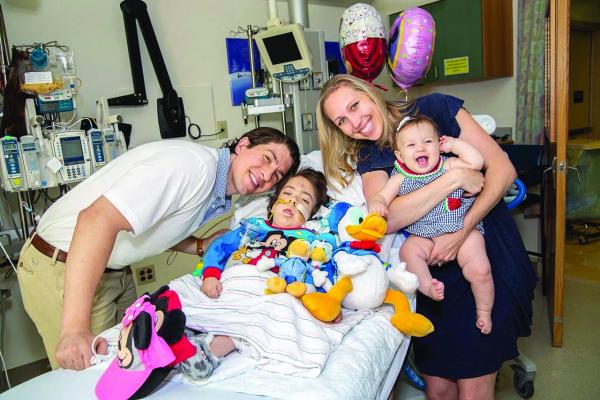October 29, 2020

Taylor Sabky with her husband Sam, her daughter Hayley, and her son Nell, center. Nell passed away from Type A Niemann-Pick disease in December of 2019.
It has been three years since the community at Boston International Newcomers Academy (BINCA) rallied around Taylor Sabky in a last-ditch effort to save her son, Purnell, who had been diagnosed at a young age with Type A Niemann-Pick Disease, an ultra-rare and incurable lipid disorder that affects fewer than 2,000 people worldwide.
As he faced a life expectancy of just a couple of years, the odds were stacked against “Nell,” as his family called him. He passed away after a courageous battle last December.
Now, with a network of supporters and an advocacy platform, Sabky and her husband Sam are looking to ensure that Purnell’s short life will have a lasting impact on the future of Niemann-Pick and on rare disease treatments in general.
Sabky, who still teaches at the BINCA school on Maxwell Street in Dorchester, told the Reporter that her family’s long, difficult journey for treatment began with very little hope. “When we got the diagnosis,” she said, “we were told that there weren’t any options, and that the best advice was to go home and love your kid.”
Rather than stand by passively, Sabky sought out more proactive approaches and discovered the Wylder Nation Foundation, an organization started by parents of another child with Niemann-Pick. There, Sabky learned about a promising gene therapy treatment that, with an injection of funding for late-stage research and safety testing, could be ready during Purnell’s lifetime.
After Sabky started a Facebook page and GoFundMe campaign called “Save Purnell Today,” her school community and neighbors sprang into action. “We accomplished our goal of $750,000. We raised that in the month of June 2017,” said Sabky.
“It was an incredible ride,” she added. “We received so much support from our local community here in Boston and beyond, and it was extremely overwhelming to be able to contribute that money toward the development of a treatment option where there has been none before.”
Sabky recalled the generosity and support of her students and colleagues at BINCA, which she called “inspirational.”
“It’s really hard to put into words how much the BINCA community has meant to me personally and to our family,” she said.
“The community we serve is recently arrived immigrant students, all English language learners, predominantly low-income, and they’ve faced tremendous trauma and are enduring tremendous trauma, so they have very difficult situations of their own, and somehow find it in their hearts to embrace you.
“Students were always asking me how I was doing, how my son was doing. When we were doing the campaign, I had a student who was living in a homeless shelter and she donated $10 and told me, ‘I’m sorry it couldn’t be more.’ They were stopping me in the hallway to give me $5 or change from their pocket. Anything they could do, they were doing, and it was tremendously inspirational.”
After running into safety testing roadblocks, the gene therapy treatment was delayed and it became clear it would not be ready in time for Purnell.
“However,” said Sabky, “it is still being developed, and they are still working on those safety studies, so the money that we raised is still contributing to a potential treatment down the line, just not in the timeline we had hoped for initially.”
Instead, the Sabkys pivoted to another potential medication option — a fatty acid amide hydrolase inhibitor— that could potentially slow the effects of the disease. A “lightning speed” process saw the medicine administered to Purnell in a matter of months.
“We found out about it in late December, and he received the treatment three months later, in March. It was an incredible timeline that almost never happens in the medical community, and even so it felt like an eternity for us, seeing Nell decline.
“But when he received the treatment we felt like it was helping to slow that decline. We noticed a significant difference from how he was going with no treatment to when he started receiving this. It just gave us hope. We felt like we were getting more time with him, and it was quality time. He was alert, interactive, his sweet happy self. So, we felt with this treatment we were able to get a lot more time than without it.”
Now, Sabky is hoping that through sharing Nell’s story and raising awareness about Niemann-Pick on social media and with the National Niemann-Pick Disease Foundation (NNPDF), other children might benefit from extended lifespans and a greater quality of life.
“All of the data that was collected with Nell will hopefully make it so that this medication would be available to other children in the future,” she explained. “Our plan as a family is to find a way to support families by sharing our story from diagnosis and beyond to advocacy, to how much you have to fight for whatever you want your experience to be with your child, and then finding the resources, the information, the support— all of those things we want to help families with because it’s a very difficult thing to navigate the day-to-day logistics while you’re also emotionally coping with such devastating news and potential.”
Just the simple act of sharing her family’s story goes a long way in raising the profile of Type A Niemann-Pick Disease and bringing a cure closer to reality, she said. “Many doctors may never encounter a patient with it, so it’s just a medical name. When we share our story, it puts a human side to the disease.”
To learn more about Purnell’s story, visit facebook.com/SavePurnellToday.



